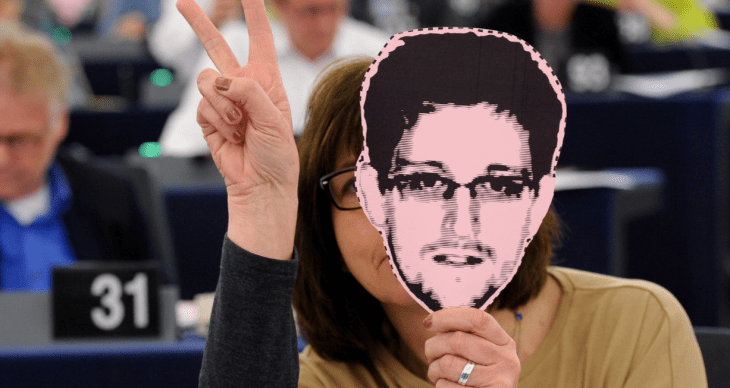Edward Snowden, who you might have heard of by now, took to Reddit today along with journalists Glenn Greenwald and Laura Poitras. Poitras won an Oscar last night for the Academy Award for Best Documentary Feature. Poitras’ winning film, CITIZENFOUR, covers when Greenwald, the filmmaker, and Snowden were together in Hong Kong, right before the documents were leaked and the world changed.
I’m no film critic, but I can understand why the film won the award — it’s a raw look at a moment in history that has proven to be geopolitically pivotal, leading to change at the level of nations and multinational corporations.
The Reddit session is much of what you would expect — you can read the full episode here — but there is one Snowden answer I think is worth highlighting in response to a question concerning how to bring domestic surveillance back to the fore of discussion, and perhaps to make it into an issue for the 2016 presidential election.
Here’s Snowden, at full length:
This is a good question, and there are some good traditional answers here. Organizing is important. Activism is important.
At the same time, we should remember that governments don’t often reform themselves. One of the arguments in a book I read recently (Bruce Schneier, “Data and Goliath”), is that perfect enforcement of the law sounds like a good thing, but that may not always be the case. The end of crime sounds pretty compelling, right, so how can that be?
Well, when we look back on history, the progress of Western civilization and human rights is actually founded on the violation of law. America was of course born out of a violent revolution that was an outrageous treason against the crown and established order of the day. History shows that the righting of historical wrongs is often born from acts of unrepentant criminality. Slavery. The protection of persecuted Jews.
But even on less extremist topics, we can find similar examples. How about the prohibition of alcohol? Gay marriage? Marijuana?
Where would we be today if the government, enjoying powers of perfect surveillance and enforcement, had — entirely within the law — rounded up, imprisoned, and shamed all of these lawbreakers?
Ultimately, if people lose their willingness to recognize that there are times in our history when legality becomes distinct from morality, we aren’t just ceding control of our rights to government, but our agency in determing thour [sic] futures.
How does this relate to politics? Well, I suspect that governments today are more concerned with the loss of their ability to control and regulate the behavior of their citizens than they are with their citizens’ discontent.
How do we make that work for us? We can devise means, through the application and sophistication of science, to remind governments that if they will not be responsible stewards of our rights, we the people will implement systems that provide for a means of not just enforcing our rights, but removing from governments the ability to interfere with those rights.
You can see the beginnings of this dynamic today in the statements of government officials complaining about the adoption of encryption by major technology providers. The idea here isn’t to fling ourselves into anarchy and do away with government, but to remind the government that there must always be a balance of power between the governing and the governed, and that as the progress of science increasingly empowers communities and individuals, there will be more and more areas of our lives where — if government insists on behaving poorly and with a callous disregard for the citizen — we can find ways to reduce or remove their powers on a new — and permanent — basis.
Our rights are not granted by governments. They are inherent to our nature. But it’s entirely the opposite for governments: their privileges are precisely equal to only those which we suffer them to enjoy.
We haven’t had to think about that much in the last few decades because quality of life has been increasing across almost all measures in a significant way, and that has led to a comfortable complacency. But here and there throughout history, we’ll occasionally come across these periods where governments think more about what they “can” do rather than what they “should” do, and what is lawful will become increasingly distinct from what is moral.
In such times, we’d do well to remember that at the end of the day, the law doesn’t defend us; we defend the law. And when it becomes contrary to our morals, we have both the right and the responsibility to rebalance it toward just ends.
Shorter Snowden: Governments don’t reform themselves, so we’ll have to do it with technology; our rights are inherent, and if we have no option other than direct action to enforce change, we might have to push.
The exchange led to one of the single best exchanges that I have ever seen on Reddit:

That gif, of course, is this one:

Snowden, you’ll note, was careful not to specify how we might go about a “rebalance” of the power of government and the rights of the private citizenry. If he had, it would have been instant fodder for the Right to claim that all along, despite every evidence to the contrary, that Snowden has indeed been an activist for intra-national regime change. A coup, in other words. Instead, Snowden points out that sometimes you will not be handed the change you are looking for.
Answering the same question, Greenwald made a salient point about the hydra that is consensus, a word that has become oddly enshrined in our modern political vernacular as a Good [Edited for length]:
The key tactic DC uses to make uncomfortable issues disappear is bipartisan consensus. When the leadership of both parties join together – as they so often do, despite the myths to the contrary – those issues disappear from mainstream public debate. […]
The problem is that the leadership of both parties, as usual, are in full agreement: they love NSA mass surveillance. So that has blocked it from receiving more debate. That NSA program was ultimately saved by the unholy trinity of Obama, Nancy Pelosi and John Bohener, who worked together to defeat the Amash/Conyers bill. […]
That’s why the Dem efforts to hand Hillary Clinton the nomination without contest are so depressing. She’s the ultimate guardian of bipartisan status quo corruption, and no debate will happen if she’s the nominee against some standard Romney/Bush-type GOP candidate. Some genuine dissenting force is crucial.
Finally, Poitras made an excellent point concerning her status as a journalist, and the different work of the filmmaker:
Thanks for the kind words. I definitely consider myself a journalist, as well as an artist and a filmmaker. In my mind, it’s not a question about whether I am one or the other. Documentary films needs [sic] to do more than journalism – they need to communicate something that is more universal.
Poitras went on to note that not only does she have more Snowden footage that she may release, but that she shot an interview with Wikileaks’ Julian Assange that she “realized in the edit room was a separate film.”
Most recently in the NSA leak saga, NSA documents sourced from Snowden and published by Greenwald showed that the NSA had compromised the security of a SIM card company, stolen encryption keys, partially rendering the security of perhaps billions of phones moot.
